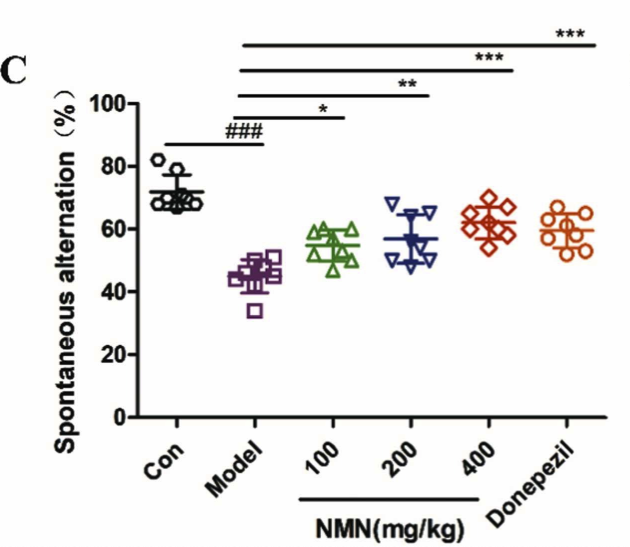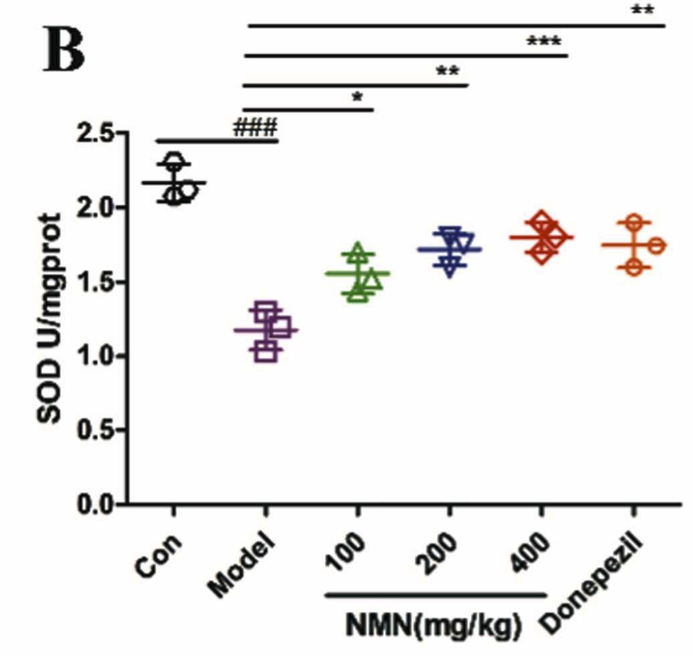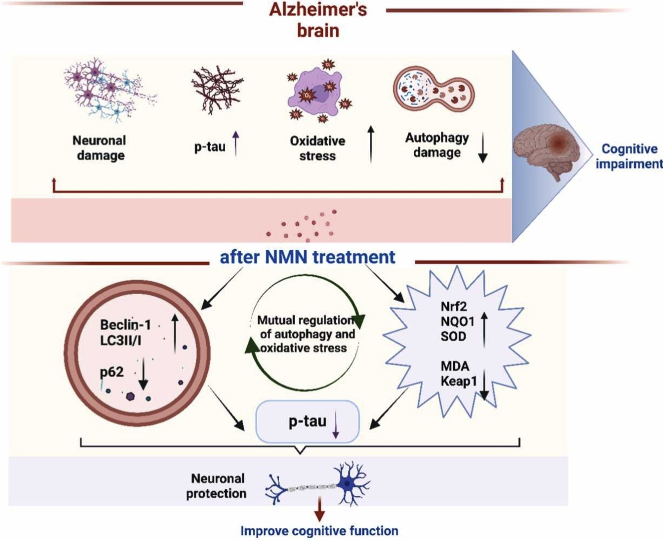This study assessed the impact of NMN injections on cognition and the therapeutic mechanisms in an Alzheimer’s disease (AD) mouse model.
Key Points
Treatment with NMN showed several benefits for mice with AD:
- Enhanced cognition and memory
- Reduced neuronal injury
- Promoted clearance of abnormal tau protein
- Activated autophagy
- Enhanced antioxidant defense and reduced free radical damage
Effects of NMN Evaluated in Alzheimer’s Disease Model Mice
AD was induced in mice by injecting Aβ1–42 (2.0 nmol/4 μL), while control mice received saline injections.
Respective treatments were administered via intraperitoneal injection.
Mice were divided into 6 groups (n=8 each):
- Control group: saline injection
- Model group: Aβ1–42 injection, saline injection
- Low-dose NMN: Aβ1–42 injection, 100 mg/kg NMN injection
- Medium-dose NMN: Aβ1–42 injection, 200 mg/kg NMN injection
- High-dose NMN: Aβ1–42 injection, 400 mg/kg NMN injection
- Positive control group: Aβ1–42 injection, 5 mg/kg Donepezil (standard AD medication)
Behavioral tests and molecular analyses were conducted 14 days after the Aβ1–42 injection.
NMN Alleviated Cognitive Impairment and Neuronal Injury in AD Mice
Behavioral tests showed that NMN significantly improved memory and cognitive function in mice with AD.
“These findings demonstrate that NMN treatment significantly alleviates cognitive impairment in AD mice.”

This figure shows that untreated AD mice (purple) had impaired spatial memory, but treatment with doses of NMN (green, blue, and red) significantly improved their memory performance, similar to the AD medication, Donepezil (orange).
Additionally, analysis of the mouse brain tissue revealed that NMN treatment significantly reduced neuronal death.
“NMN can effectively mitigate Aβ-induced neuronal damage and loss in AD mice, resulting in an improvement in cognitive function.”
NMN Improved Clearance of Abnormal Tau via Autophagy
The tau protein, which is crucial for brain cell growth, builds up abnormally in the AD brain.
In the study, the untreated AD mouse brains showed a significant increase in tau protein, but this buildup was prevented with NMN treatment.
“The results demonstrated that NMN treatment could reduce the level of p-tau protein induced by Aβ.”
Autophagy is the cell’s recycling system, breaking down old or damaged cell parts, including protein clumps, which may malfunction in AD.
“Therefore, we hypothesized that NMN plays a vital role in AD by promoting autophagy.”
Researchers found that autophagy was significantly more active in NMN-treated mice with Alzheimer’s disease compared to untreated mice.
“NMN demonstrates the ability to reverse the autophagy dysfunction caused by Aβ.”
Enhanced Protection Against Oxidative Stress
Mice with AD that received NMN had significantly higher levels of the antioxidant superoxide dismutase (SOD), showing increased protection against free radicals.
This figure shows that untreated mice with AD (purples) had low SOD levels, but NMN treatment (green, blue, red) raised SOD levels similar to those of mice treated with standard AD medication (orange).

Additionally, the levels of malondialdehyde (MDA), which indicate free radical damage, were significantly reduced in the brains of mice with AD treated with a high dose of NMN.

Graphical abstract illustrating the proposed therapeutic effects and mechanisms of NMN in Alzheimer’s disease (AD) mice, as identified in this study.
AD is characterized by neuronal damage, accumulation of p-tau protein, oxidative stress, and reduced autophagy, leading to cognitive impairment. The study found treatment with NMN:
- Improved autophagy (indicated by Beclin-1, LC3II/I, p62)
- Enhanced protection against oxidative stress (indicated by Nrf2, NQ01, SOD, MDA, Keap1)
- Improvements in autophagy and oxidative stress protection led to reduced tau protein accumulation, better neuronal protection, and improved cognitive function
“These results suggest that NMN induces a mutual regulation of antioxidative stress and autophagy, thereby effectively reduces the level of p-tau, protects neurons, and ultimately ameliorates cognitive impairment.”
Conclusion
This study showed that intraperitoneal injection of NMN improved cognition and reduced neuronal damage in an AD mouse model.
“NMN treatment could significantly alleviate cognitive dysfunction and hippocampal neuronal damage in AD mice.”
Mice receiving NMN showed higher levels of the antioxidant SOD and reduced MDA, a marker of free radical damage.
“These findings suggest that NMN protects the brains of AD mice from free radical attack and enhances their ability to scavenge free radicals, thereby preventing the occurrence of oxidative stress in the AD mouse brain.”
The accumulation of tau protein, a hallmark of AD, was reduced in AD mice treated with NMN, likely due to the enhanced activation of autophagy clearance processes.
“Aβ induces abnormal accumulation of p-tau in the mouse brain, and this accumulation is inhibited following NMN administration.”
NMN improved cell cleanup and protection against free radical damage, preventing AD symptoms like protein buildup, brain cell damage, and memory loss.
“We discovered that NMN exerts a protective effect against cognitive impairment in AD mice, highlighting its pivotal role in regulating the interplay among autophagy, oxidative stress, and p-tau.”
